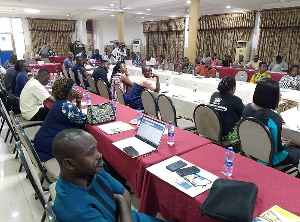 The engagement brought together stakeholders from the mining sector and other areas
The engagement brought together stakeholders from the mining sector and other areas
Stakeholders' engagement in the draft Legislative Instrument (L.I.) for water resources pollution control, effluent discharge, and riparian buffer zone regulations has been held in Kumasi, in the Ashanti Region.
The engagement, organized by the Water Resources Commission (WRC), brought together stakeholders from the mining and agricultural sectors, representatives from the Environmental Protection Agency (EPA), the Forest Commission, and the district assemblies.
The engagement is part of government plans to formalize the activities of artisanal and small-scale mining under the Ghana Landscape Restoration and Small-Scale Mining Project (GLRSSMP).
The Chief Basin Officer of the Water Resources Commission (WRC), Mawuli Lumor, said in his address on Tuesday that the meeting "will assist the commission in the development of legislative instruments to regulate the discharge of water in all its controlled forms into water bodies and prescribe the acceptable levels of pollution for all freshwater."
Mawuli Lumor expressed confidence that "the two L.I.s would play a significant role in tackling the nation's major problems with buffer deterioration and water resource pollution once they were passed."
He made an appeal for the support of the environmental protection project to traditional authorities, small-scale miners, MMDAs, and other influential people to save the environment.